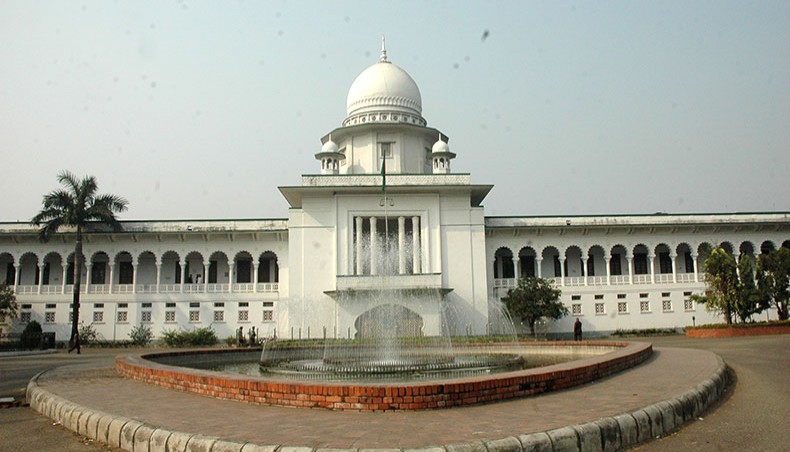JS finally loses power to remove SC judges
The Appellate Division on Monday dismissed a government appeal against a High Court verdict that had scrapped the 16th amendment to the constitution which empowered Jatiya Sangsad to remove Supreme Court judges for misbehaviour or incapacity.
The seven-member full bench led by chief justice SK Sinha pronounced the unanimous judgement in a packed courtroom.
The pronouncement of the judgement, which was scheduled for 9:00am, was delayed by one hour and a half.
Six other judges were Justice Md Abdul Wahhab Miah, Justice Nazmun Ara Sultana, Justice Syed Mahmud Hossain, Justice Muhammad Imman Ali, Justice Hasan Foez Siddique and Justice Mirza Hussain Haider.
The highest court, however, rejected some observations the High Court made in its verdict.
The government had field another petition for scrapping High Court’s observations against lawmakers that a vast majority of them had criminal records.
On May 5, 2016, the High Court declared the 16th amendment to the constitution unconstitutional stating that ‘the Sixteenth Amendment is a colourable legislation and is violative of separation of powers among the three organs of the State, namely, the Executive, the Legislature and the Judiciary and independence of the judiciary as guaranteed by Articles 94(4) and 147(2), two basic structures of the constitution and the same are also hit by Article 7B of the constitution.’
On June 1, 2017, the Appellate Division concluded the hearing in the appeal and said that the judgement would be delivered any day.
The bench heard the appeal for 11 days when 12 amici curiae gave their views on the 16th amendment—nine of them opposed the amendment and two did not turn up and lawyer Ajmalul Hossain was the lone amicus curiae to support the 16th amendment.
The previous constitutional provisions for a Supreme Judicial Council inquiry led by the chief justice for removal of Supreme Court judges for misconduct or incapability would be reinstated automatically following the Appellate Division judgement, lawyer Manzill Murshid told reporters.
Manzill, the lawyer of the public interest litigation writ petition filed by nine Supreme Court lawyers in which the High Court scrapped the 16th amendment, termed the verdict a landmark for the establishment of the independence of the judiciary.
Senior lawyer M Amirul Islam, one of the framers of the constitution, said that now the Supreme Judicial Council would automatically be reinstated.
Jurist Shahdeen Malik, also University of Asia Pacific’s law teacher, however, said that the Supreme Judicial Council would not be restored automatically and parliament would need to pass a law stipulating procedures for the removal of Supreme Court judges.
He said that now there was a vacuum in the constitution with regard to the procedure for removal of Supreme Court judges and other constitutional office holders.
Attorney general Mahbubey Alam said that the Supreme Judicial Council introduced in the constitution through a martial law proclamation during the regime of late president Ziaur Rahman would not automatically be restored unless the parliament made an amendment repealing the 16th amendment.
He said that he was disappointed with the apex court judgement saying that it barred the Article 96 of the constitution from taking its original shape as framed in 1972.
It was the fifth verdict of the apex court that had scrapped amendments to the constitution.
The scrapped amendments include 5th amendment relating to martial law regime in 1975-1979, 7th amendment relating to the martial law regime of deposed dictator HM Ershad, 8th amendment relating to establishment of High Court benches in different divisions, 13th amendment relating to introduction of national election-time caretaker government and 16th amendment relating to removal of Supreme Court judges.
Asked about the earlier Supreme Court verdicts that had scrapped four amendments, Mahbubey Alam said that the government was happy with the four earlier verdicts following which the government took ‘the constitution back to its original shape.’
Law minister Anisul Huq posed a question to journalists at his office, ‘How the 16th amendment could be ultra vires as the amendment was made to take the Article 96 of the constitution regarding removal of Supreme Court judges to its original shape?’
The minister said that the government would decide the next course of action after getting the copy of the judgement.
The Bangladesh Nationalist Party and Pro-BNP lawyers welcomed the judgement distributing sweets among lawyers.
BNP joint secretary general AM Mahbub Uddin Khokon, also the Supreme Court Bar Association secretary, said that the 16th amendment was made by the government to establish its political control over the Supreme Court judges.
The 16th amendment to the constitution was made in September 2014 empowering parliament to remove Supreme Court judges for ‘misbehaviour’ of ‘incapacity’.
The original Article 96, framed in 1972, had empowered parliament to remove Supreme Court judges for misconduct or incapacity.
The 4th amendment to the constitution in 1975, during the rule of the country’s founding president Sheikh Mujibur Rahman, took away the parliament’s power and gave it absolutely to the president.
The 5th amendment to the constitution, during the rule of Ziaur Rahman, retained the power of the president to remove Supreme Court judges subject to recommendation made by the Supreme Judicial Council comprising the chief justice and the two next senior judges following an inquiry into the conduct and capacity of a judge concerned.
News Courtesy: www.newagebd.net











